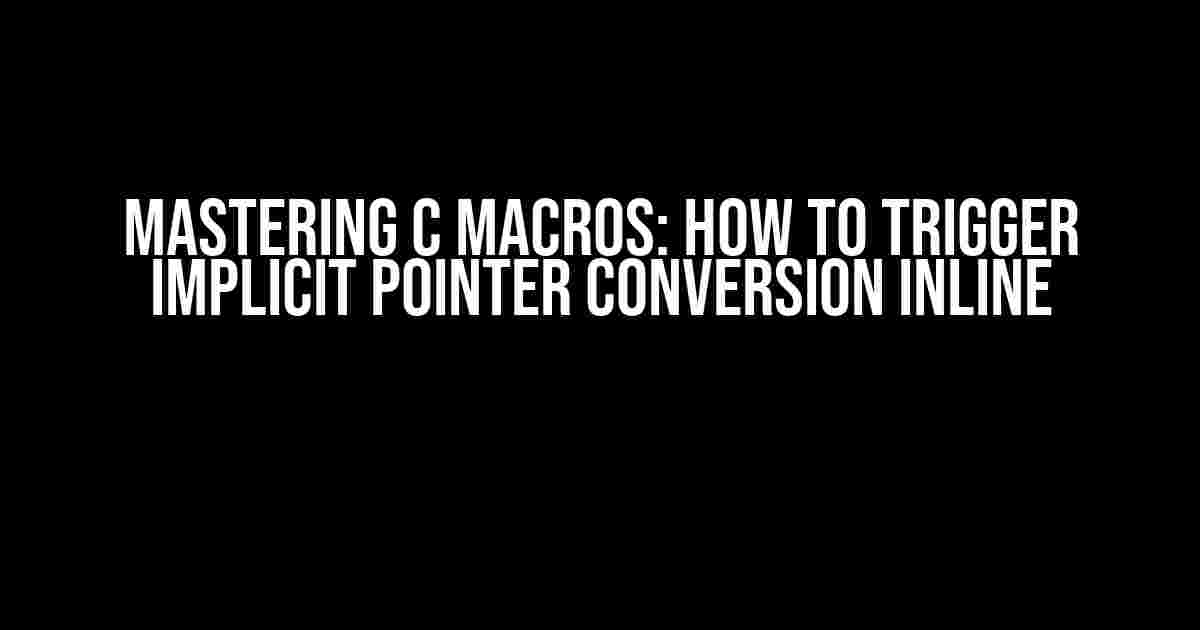Are you tired of dealing with tedious and error-prone pointer conversions in your C code? Do you wish there was a way to simplify your code and make it more efficient? Look no further! In this article, we’ll dive into the world of C macros and explore how to trigger implicit pointer conversion inline, making your coding life easier and more enjoyable.
What is Implicit Pointer Conversion?
Before we dive into the meat of the article, let’s quickly cover what implicit pointer conversion is. In C, implicit conversion occurs when a pointer of one type is assigned to a pointer of another type without the need for an explicit cast. This can happen when you’re working with pointers to different data types, such as integers and characters.
For example, consider the following code:
int x = 10;
char *p = &x;In this example, the pointer `p` is assigned the address of the integer `x` without the need for an explicit cast. This is an example of implicit pointer conversion, where the compiler automatically converts the `int*` pointer to a `char*` pointer.
Why Use Macros for Implicit Pointer Conversion?
So, why use macros for implicit pointer conversion? Well, there are several reasons:
- Code Readability:** Macros can make your code more readable by hiding complex pointer conversions behind a simple, easy-to-understand interface.
- Code Reusability:** Macros allow you to reuse code, reducing the amount of code you need to write and maintain.
- Code Efficiency:** Macros can make your code more efficient by reducing the number of explicit conversions needed.
How to Trigger Implicit Pointer Conversion Inline in a C Macro?
Now that we’ve covered the why, let’s dive into the how. To trigger implicit pointer conversion inline in a C macro, you’ll need to use the following syntax:
#define CONVERT_PTR(ptr, type) ((type *)(ptr))This macro takes two arguments: `ptr`, the pointer to convert, and `type`, the type to convert the pointer to. The macro uses the `((type *)(ptr))` syntax to trigger implicit pointer conversion.
Let’s break down how this macro works:
- The `(type *)` part of the macro tells the compiler to convert the pointer `ptr` to a pointer of type `type*`.
- The `ptr` part of the macro is the pointer to convert.
- The `(( ))` around the entire expression tells the compiler to evaluate the expression as a single unit.
Here’s an example of how you can use this macro:
int x = 10;
char *p = CONVERT_PTR(&x, char);
printf("Address of x: %p\n", p);In this example, the `CONVERT_PTR` macro is used to convert the `int*` pointer `&x` to a `char*` pointer `p`. The resulting `char*` pointer is then printed using `printf`.
Common Pitfalls to Avoid
While implicit pointer conversion can be a powerful tool, it’s not without its pitfalls. Here are some common mistakes to avoid:
- Loss of Type Safety:** Implicit pointer conversion can lead to loss of type safety, making it easier to introduce bugs into your code. Be careful when using implicit conversion, and make sure you understand the types involved.
- Unintended Conversions:** Make sure you understand the implications of implicit conversion on your code. Unintended conversions can lead to unexpected behavior and bugs.
Advanced Techniques: Using Macros with Multiple Arguments
So far, we’ve covered the basics of implicit pointer conversion using macros. But what if you need to convert multiple pointers at once? That’s where advanced macro techniques come in.
Let’s say you have a struct with multiple pointer fields, and you want to convert all of them to a different type. You can use a macro with multiple arguments to achieve this:
#define CONVERT_STRUCT_PTR(struct_ptr, type1, type2) \
do { \
((type1 *)(&(struct_ptr)->field1)) = (type1 *)(struct_ptr)->field1; \
((type2 *)(&(struct_ptr)->field2)) = (type2 *)(struct_ptr)->field2; \
} while (0)This macro takes three arguments: `struct_ptr`, the pointer to the struct, and `type1` and `type2`, the types to convert the struct fields to.
Here’s an example of how you can use this macro:
typedef struct {
int *field1;
char *field2;
} MyStruct;
MyStruct s;
s.field1 = &x;
s.field2 = "hello";
CONVERT_STRUCT_PTR(&s, char, int);
printf("Address of s.field1: %p\n", s.field1);
printf("Address of s.field2: %p\n", s.field2);In this example, the `CONVERT_STRUCT_PTR` macro is used to convert the `int*` field `field1` and the `char*` field `field2` to `char*` and `int*` respectively.
Conclusion
In this article, we’ve covered the basics of implicit pointer conversion using C macros. We’ve seen how to trigger implicit pointer conversion inline using a simple macro, and how to avoid common pitfalls. We’ve also explored advanced techniques for using macros with multiple arguments to convert multiple pointers at once.
By mastering implicit pointer conversion using C macros, you can write more efficient, readable, and reusable code. Remember to use these techniques wisely, and always keep type safety and unintended conversions in mind.
| Macro | Description |
|---|---|
#define CONVERT_PTR(ptr, type) ((type *)(ptr)) |
Converts a pointer to a specific type using implicit conversion |
#define CONVERT_STRUCT_PTR(struct_ptr, type1, type2) ... |
Converts multiple pointer fields of a struct to specific types using implicit conversion |
We hope you’ve enjoyed this article on implicit pointer conversion using C macros. Happy coding!
Frequently Asked Question
Get ready to dive into the world of C macros and implicit pointer conversion! Here are the top 5 questions and answers to help you master this complex topic.
What is implicit pointer conversion in C, and how does it relate to macros?
Implicit pointer conversion is a feature in C that allows a pointer to be automatically converted to a different type of pointer. In the context of macros, implicit pointer conversion can be triggered inline using clever macro definitions. This allows for more flexibility and convenience when working with pointers in your C code.
How do I trigger implicit pointer conversion using a C macro?
To trigger implicit pointer conversion using a C macro, you can use a generic pointer type, such as `void*`, and then use the `(__typeof__())` operator to cast the pointer to the desired type. For example: `#define CONVERT_PTR(ptr) ((__typeof__(ptr)) ptr)`. This macro will automatically convert the `ptr` argument to the type specified by the `__typeof__` operator.
What are some common pitfalls to watch out for when using implicit pointer conversion in C macros?
One common pitfall is using implicit pointer conversion without proper type checking, which can lead to undefined behavior or crashes. Another pitfall is neglecting to consider the alignment and size of the target type, which can cause issues when converting between pointer types. Finally, be mindful of potential issues with pointer aliasing and strict aliasing rules.
Can I use implicit pointer conversion with C++-style casting in a C macro?
While C++-style casting is not directly supported in C, you can use the `(__builtin_expect())` function to achieve similar results. For example: `#define CONVERT_PTR(ptr) ((__builtin_expect(!!(ptr), 1)) ? (typeof(ptr)) ptr : (void*) 0)`. This macro uses the `__builtin_expect()` function to cast the `ptr` argument to the desired type, while also providing a fallback to a `void*` pointer in case of a null pointer.
Are there any alternatives to implicit pointer conversion in C macros?
Yes, there are alternatives to implicit pointer conversion in C macros. One approach is to use explicit casting using the `()` operator, such as `#define CONVERT_PTR(ptr) ((typeof(ptr)) ptr)`. Another approach is to use a separate function or inline function to perform the pointer conversion, which can provide more flexibility and type safety.



